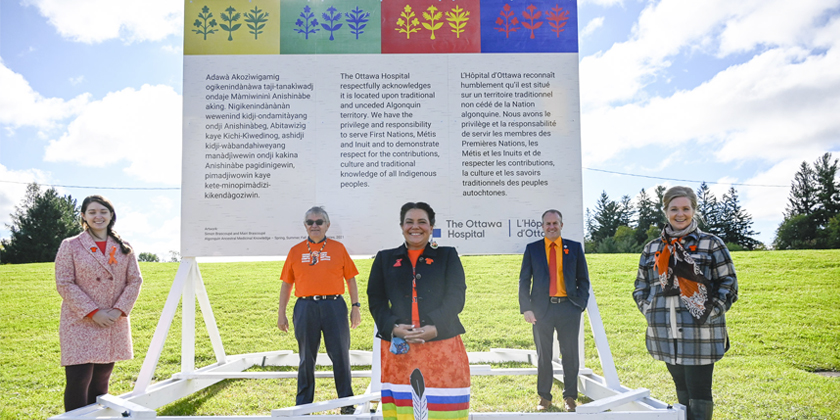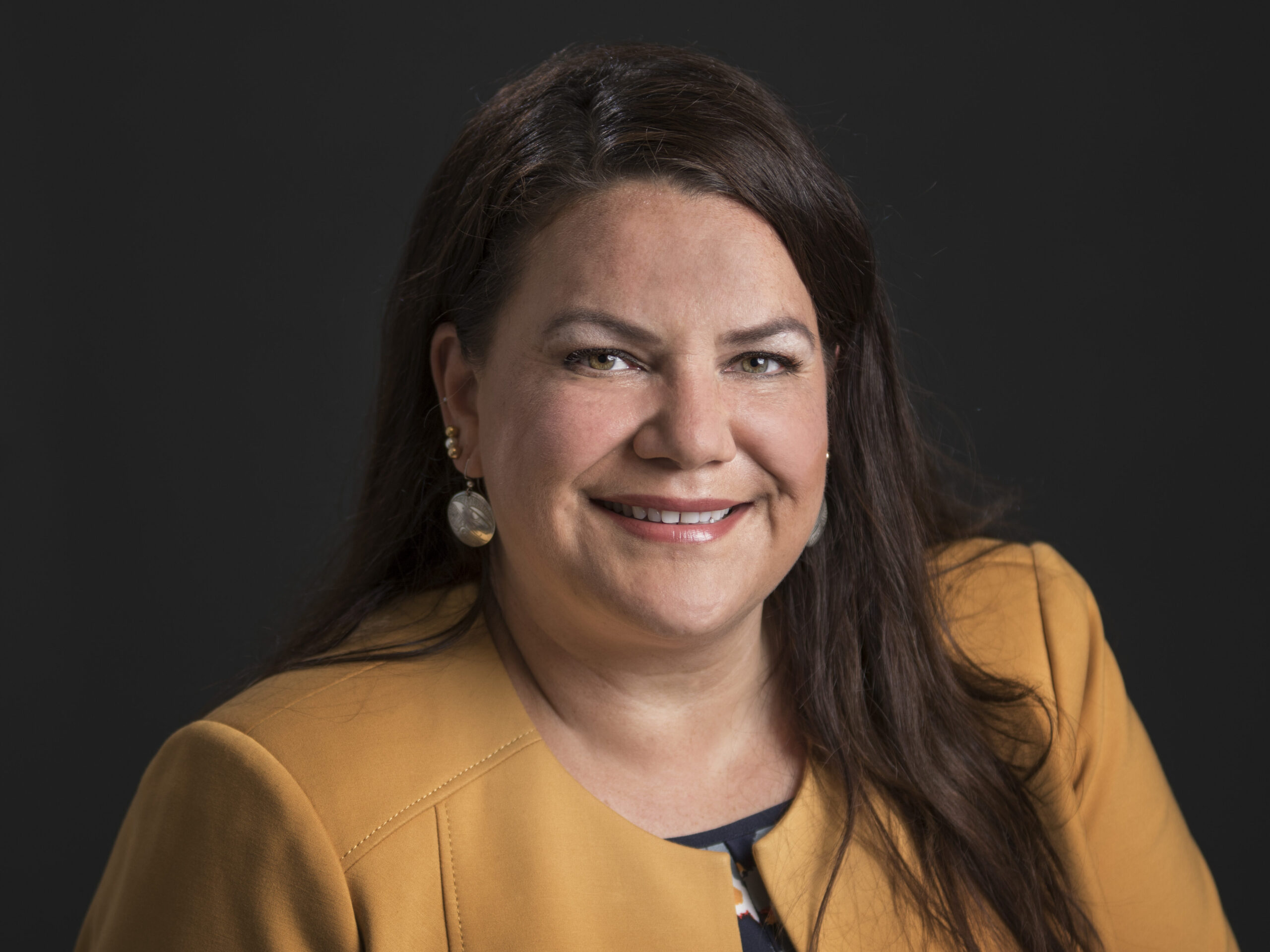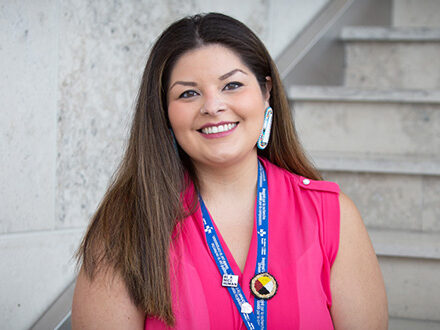Indigenous partnerships and The Ottawa Hospital’s journey of reconciliation
Jun 19, 2023

As The Ottawa Hospital moves forward with plans to reshape the future of health care, including the construction of what will become one of Canada’s most modern, technologically advanced, and accessible hospitals, its staff are building important partnerships with Indigenous Peoples, communities and organizations on its journey of reconciliation.
“While we have a long way to go, The Ottawa Hospital is fully committed to the work of reconciliation and we are grateful to be guided by First Nation, Inuit and Métis leaders, physicians, health organizations and community members,” says Cameron Love, President and CEO of The Ottawa Hospital.
“The Ottawa Hospital is committed to achieving equitable access to culturally safe care without discrimination, and health care that respects Indigenous Peoples’ traditional and living knowledge in all aspects of their health,” adds Cameron. “The reality is we cannot do this work without meaningful engagement with Indigenous Peoples whose insights, knowledge and contributions have been instrumental in our efforts to create a true Indigenous health and healing approach across all of our programs in the organization and at all of our sites, and I look forward to our continued work together.”
With a service area spanning the greater Ottawa and Eastern Ontario region, Western Quebec and the Eastern region of Nunavut, The Ottawa Hospital has the privilege of serving the three distinct Indigenous groups in Canada: First Nations, Inuit and Métis. This service area includes the territories of three First Nation communities: Kitigan Zibi Anishinabeg, Algonquins of Pikwakanagan First Nation and the Mohawk Council of Akwesasne.
The Ottawa Hospital also serves Métis people living within the service area and a significant Inuit population living in the Ottawa area and many who travel for care from the Eastern or Qikiqtaaluk or Baffin region of Nunavut.
The Indigenous Peoples Advisory Circle and Indigenous Engagement
The Indigenous Peoples Advisory Circle, which is guiding The Ottawa Hospital’s work of reconciliation, is comprised of First Nation, Inuit and Métis leaders, physicians, health providers and community members from across its service region. Members of The Circle provide insights and advice to The Ottawa Hospital on building a common future for Indigenous health and healing, focused on meaningful involvement and engagement of Indigenous Peoples.
“It is critical to bring collective First Nation, Inuit and Métis voices to the table,” says Marion Crowe, Chair of the Indigenous Peoples Advisory Circle and the first Indigenous appointment to The Ottawa Hospital Board of Governors. “We all have our own experiences rooted in distinct knowledge and cultures. Truth must come before reconciliation and The Circle ensures the truths of Indigenous Peoples guide the hospital toward actions that create a space where all patients and their families feel safe, cared for, and respected.”
The Circle also provides invaluable insight into the exciting new design of The Ottawa Hospital’s new campus, which is currently in the early stages of construction.
“Informing the design and building of a new hospital campus is a once in a lifetime opportunity and we’re thankful and proud to be guided by the stewards of the land here in Algonquin territory,” says Marion. “Imagine a new campus where Indigenous languages and traditional healing medicines become more than just artwork on the walls, where we see them being translated into the services we offer and put into practice to create healing paths to wellness.”

Since its establishment in 2021, members of the Indigenous Peoples Advisory Circle have identified priorities for action by The Ottawa Hospital and its Research Institute with the development of a joint Indigenous Engagement Framework and Action Plan.
“The Engagement Framework and Action Plan is the foundation for The Ottawa Hospital’s work of reconciliation,” says Marion. “The Plan is focused on how the hospital can take tangible actions that will advance Indigenous priorities in health care identified by the Indigenous Peoples Advisory Circle. For any actions to be meaningful, it is critical that they address systemic racism, discrimination, and inequities pervasive in the health-care system.”
The Ottawa Hospital and its Research Institute have worked together with Indigenous leaders and partners to identify specific commitments and initiatives grouped under six themes that align with the Truth and Reconciliation Commission Calls to Action, as well as the Joyce Echaquan principle, the United Nations Declaration on the Rights of Indigenous Peoples, and the recommendations from the final report from the National Inquiry into Missing and Murdered Indigenous Women and Girls.
Engaging early and often with First Nation, Inuit and Métis people and organizations is essential in the work of reconciliation.
“Building trust is key to any partnership and it’s critical to any work of reconciliation,” says Lori Kittelberg, the Indigenous Partnerships and Engagement Strategist at The Ottawa Hospital.
New in the role at The Ottawa Hospital, Lori, who is a member of Caldwell First Nation and a breast cancer survivor, adds this work is close to her heart. “I’m grateful to play a role in building relationships, working with Indigenous partners and organizations toward meaningful action to address systemic racism, and to help make The Ottawa Hospital a safe space for First Nation, Inuit and Métis patients, families and staff.”
The themes in The Ottawa Hospital Indigenous Engagement Framework and Action Plan are:
- Traditional knowledge: telling the stories and learning from Elders and Knowledge Keepers
- Creating a safe environment for care
- Integrating Indigenous values and cultures into work and processes
- Creating space that reflects Indigenous learnings, values, and healing practices
- Creating economic partnership opportunities, skills training, and employment opportunities
- Building trust and partnerships with Indigenous Peoples and organizations
Research has a key role in many of these themes, from understanding issues related to Indigenous determinants of health to studying Indigenous healing practices to implementing new approaches to address the distinct health needs of Indigenous Peoples.
“We have the privilege and responsibility to represent and include Indigenous Peoples in our research and address Indigenous health needs,” says Dr. Duncan Stewart, Executive Vice-President of Research at The Ottawa Hospital. “We look forward to working with the Indigenous Peoples Advisory Circle to realize this plan.”
Indigenous Employee Network
Under the leadership of Co-Chairs Mackenzie Daybutch and Toba Miller, the Indigenous Employee Network meets regularly to discuss priorities for support, public education and driving change across all campuses.

“The Indigenous Employee Network is a sacred space where First Nation, Inuit and Métis employees and non-Indigenous allies can connect, share experiences and celebrate Indigenous cultures,” says Mackenzie, who is Ojibway from Mississauga First Nation #8 in Northeastern Ontario and the Program Coordinator for the Regional Indigenous Cancer Program at The Ottawa Hospital. “When you come here, you know that there are people like you, people who support you and value your traditional knowledge.”
All employees need to feel safe in their place of work, and this is the precise goal of the Indigenous Employee Network at The Ottawa Hospital.
Mackenzie adds that while the Network is employee-driven, the impact of its work should also be felt by patients at The Ottawa Hospital. “The hope is that patients feel strengthened by the idea that this group seeks to make positive changes for them,” she says. “Through the organic education that happens through discussion, I know that knowledge of the culture, values and history is being passed on, and I hope this Network contributes to each member’s ability to provide compassionate care to all patients.”


